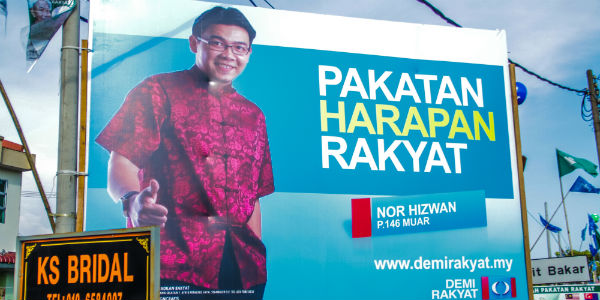Elections without democracy: how Singapore and Malaysia pre-empt dissent from the ground up
Elections are not the only barometer of a country’s democratisation. In a number of hybrid regimes, forms of authoritarian strategies hinder the ability of opposition parties to cut through and challenge the existing order. Meredith L Weiss (University at Albany) explains how this works on the ground in Singapore and Malaysia.

A 2013 election poster for the Pakatan Rakyat opposition coalition in Bandar, Malaysia. It won a popular majority but not the election, and now effectively no longer exists. Photo: Sham Hardy via a CC-BY-SA 2.0 licence
When we think about a country’s democratic credentials, we tend to focus on elections. Are they free and fair? Explanations for the persistence (and failure) of illiberal regimes are rife. But most of them look at the specific mechanisms elites use to manipulate electoral politics – from gerrymandering constituencies, to disempowering legislators and judges, to restricting media content and consumption. Other scholars home in on patronage and access to public resources, on outside influences and inducements, or on strategic calculations among hard-line and reformist elites.
What legislators actually do once elected, the political culture and norms and the wider frame of state–society relations garner less attention. Singapore and Malaysia are particularly interesting in this regard. While electoral authoritarian regimes are not terribly rare, Singapore and Malaysia’s are the most enduring representatives of the category. Both have been ruled by the same party or coalition since independence: the Barisan Nasional (National Front or BN, initially organized as the Alliance) in Malaysia and the People’s Action Party (PAP) in Singapore. Malaysia falls within the range of ‘competitive’ electoral authoritarianism and Singapore within the ‘hegemonic’ variant, since elites in the latter are less vulnerable to opposition challenge. Elites in both, however, rely upon voluntary support more than coerced compliance and aim for genuine political legitimacy.
Singapore and Malaysia both engage in a panoply of practices to curb civil liberties and electoral contests. But they have also reshaped connections among tiers of government – and between politicians and voters – to privilege instrumental, short-term, atomised assessments over programmatic or ideological appeals. These amplify the dominant party’s resource advantages. Voters become accustomed to non-programmatic, non-ideological standards for accountability and political legitimacy. Taken together, these strategies not only keep the dominant party in place, but also lessen the likelihood of a dramatic or quick change in the regime-writ-large should that party fall.
The consistency of the Malaysian and Singaporean regimes is striking. Their extraordinary persistence stems not only from their ability to repress opposition, skew elections, and pay off potential challengers, but their supporting entrenched political machines and robust clientelist linkages between voters and politicians. In both, that link between politician and constituent extends beyond dispensation of material patronage to include a sense of personal connection between politician and voter. That pattern has come to shape aspects of political culture: what voters expect of any politician, how they understand and approach the state, and the incentives to which incumbents and challengers alike respond. Over time, it comes to be in the interest of opposition politicians to play the game, given the imperative of election. Once they have become used to machine politics, not only do structural hurdles make it hard for citizens to vote in new leaders, but the opposition may end up reproducing rather than subverting key attributes of the regime.
In Malaysia, local government elections were first suspended, then abrogated altogether by the early 1970s. Local and state tiers of government are now essentially fused: the state government nominates local councillors, usually from among party faithful (frequently regardless of other qualifications). Opposition-held state governments have experimented with including nonpartisan representatives and called for restoration of elections, but have rather quickly defaulted to the same sorts of party loyalists on whom the BN relies, extending the reach of the state government and partisan machinery. State and federal legislators focus substantially on municipal service, backed by blended party and personal machines (on the opposition side, relying heavily on private funds), and expect voters to evaluate them largely according to those efforts.
Likewise in Singapore, the newly-emplaced PAP did away with local government in 1959, then reintroduced town councils, headed by members of parliament, in the 1980s. In what the party explicitly presents as a local-election strategy, they, too, ask voters to assess MPs per their management of public housing estates in which most Singaporeans live – and only PAP MPs have access to substantial funds for improvements to those estates. In both countries, too, dominant- and opposition-party legislators alike spend inordinate time on constituency service and outreach, from weekly meet-the-people sessions in Singapore to weekends of endless weddings, funerals, and other appearance-making in Malaysia.
With contests increasingly tight in both countries, the extra nudge of a personal vote, cultivated through such activities, may well tip the electoral scales. More to the point, over time, these efforts nurture enduring expectations and norms – they become what voters expect of their politicians, however much parties seek to differentiate themselves per policy proposals or normative claims. The emphasis on the ‘personal touch’ gives challengers a way to circumvent lack of access to constituency development funds or other patronage resources, but pulls legislators away from policy or party-building work. Moreover, however instrumentally challengers may embrace the system-that-is as they woo support by outperforming the dominant party according to its own criteria, they risk perpetuating that system as they seek not only to secure, but to retain power, backed by voters acculturated to machine-oriented, clientelistic politics.
The extraordinary resilience of Malaysia and Singapore’s regimes is best explained, then, not only by the usual metrics of electoral manipulation, nor even deep party/public coffers. Also important is how politics happens on the ground: a form of machine politics premised on clientelistic linkages extending beyond the party; lubricated, but not solely sustained, by patronage (and much of that from private, not public, funds); and to which all politicians are pressed to conform. Cultivating personal networks, including through targeted patronage, may entail remarkable responsiveness and direct accountability – and many voters do still vote on different grounds. Yet these ground-level dimensions strengthen hybridity. Clientelist linkages may be mutually (if unequally) beneficial, but they impede new ideological or policy objectives by aligning voters’ and politicians’ interests in purposefully narrow terms; perpetuate piecemeal and likely inefficient allocation of resources; assume that many or most voters should expect little from state policies, and thus not evaluate candidates in programmatic terms; and tend to favour the resource-rich. Taken together, these effects combine with a less than free and fair electoral playing field to keep electoral authoritarianism firmly entrenched.
Elections neither fully constitute nor represent the regime, nor can they be the sole arena for regime change. Looking at regimes in this way forces us to switch our focus from structures towards agents in order to understand how the regime functions. This means exploring where state and society meet, including the networks and shared understandings through which politicians, whether in office or aspiring, operate on the ground. This dimension is especially important in assessing the workings of ‘hybrid’, or electoral authoritarian, regimes, stably situated between democracy and authoritarianism. Even if an opposition party or coalition wins election, that win does not necessarily reshape the linkages between politicians and constituents, access to policy agendas, or other key attributes of the existing regime.
This post represents the views of the author and not those of Democratic Audit.
 Meredith L Weiss is a Professor at the Rockefeller College of Public Affairs and Policy, University at Albany (State University of New York). For the full version of this argument, see the 2017 article, ‘Going to the Ground (or AstroTurf: A Grassroots View of Regime Resilience’, Democratization 24 (2): 265-82.
Meredith L Weiss is a Professor at the Rockefeller College of Public Affairs and Policy, University at Albany (State University of New York). For the full version of this argument, see the 2017 article, ‘Going to the Ground (or AstroTurf: A Grassroots View of Regime Resilience’, Democratization 24 (2): 265-82.





 Democratic Audit's core funding is provided by the Joseph Rowntree Charitable Trust. Additional funding is provided by the London School of Economics.
Democratic Audit's core funding is provided by the Joseph Rowntree Charitable Trust. Additional funding is provided by the London School of Economics.